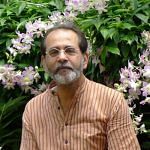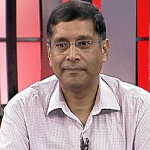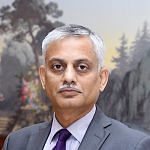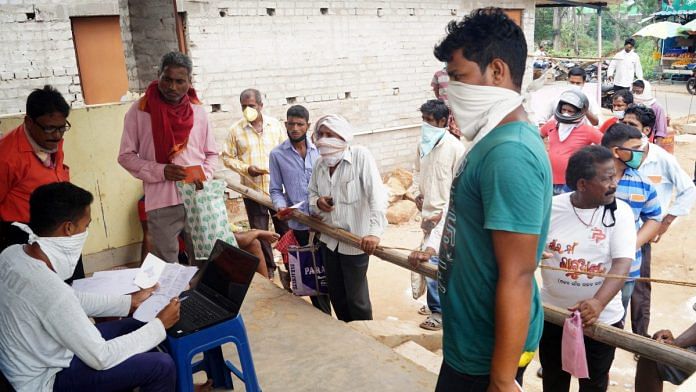 Women: The invisible face of hunger
Women: The invisible face of hunger
Renana Jhabvala | President of SEWA Bharat, the national federation of SEWA
Hindustan Times
As the lockdown nears the two-month mark, millions of stories of struggle and deprivation in India’s working class have been told, but Jhabvala focuses on those that have been most invisible — the women. “The women left behind in the villages, while their menfolk migrate, are equally deprived of food and cash,” she argues. While the government has put systems in place where grains are widely available, Jhabvala argues that “a certain percentage, usually the most vulnerable, are outside the zone of this security net”.
 The trends shaping the post-COVID-19 world
The trends shaping the post-COVID-19 world
Rakesh Sood | Former diplomat and currently Distinguished Fellow at the Observer Research Foundation
The Hindu
In the post-coronavirus world, Sood argues that “six geopolitical lines will define the contours of the emerging global order.” First, rise of Asia and decline of the West, given their greater agility in tackling the pandemic and resilient economies. Second, growing intra-European tensions with the Brexit and “financial crisis among the Eurozone members”. Third, the deepening of the North-South divide in Europe with the Schengen visa being hit and Italy facing denial of medical equipment from the EU. Fourth, China as a global power despite coming under the scanner for the spread of Covid-19 and its growingly confrontational relationship with the US. Fifth, diminishing international and multilateral bodies such as the WHO due to power politics. And finally, renewables and green technologies were becoming increasingly popular but with countries’ economies severely hit due to the pandemic “economic recession and depressed oil prices” loom.

 Take it down to districts: Make empowered district administrations the centrepiece of India’s Covid fight
Take it down to districts: Make empowered district administrations the centrepiece of India’s Covid fight
Dr Devi Shetty | Cardiac surgeon and Chairman and Founder, Narayana Health
Kiran Mazumdar-Shaw | Chairperson, Biocon Ltd
The Times of India
Shaw and Shetty argue that “there are no big problems, there are just a lot of little problems” with the Covid-19 pandemic. While the lockdown has reduced the deaths by 50 per cent, the remaining can be managed by putting the correct strategy in place which is to “convert the district administration into the ‘centre of action’,” they write. Secondly, we must ensure well equipped “test, track and quarantine” measures in each district with “at least two testing centres with a PCR machine”. Third, protecting the vulnerable by reducing social stigma and providing medicines, food and other necessities. Finally, in order to keep a low mortality rate, Shaw and Shetty suggest that “the district administrations should only be given broad guidelines and allowed to craft their own strategy to deliver results.”

 Plotting the revival
Plotting the revival
Arvind Subramanian | Former chief economic advisor to the government of India
Josh Felman | Former IMF Resident Representative to India
The Indian Express
Subramaniam and Felman suggest a three-pronged approach to revive the Indian economy, after the devastating impact of the Covid-19 pandemic and subsequent lockdown, underscoring the importance of speed and how it is the only way to minimise losses. First, “special, expedited, non-adversarial and time-bound bankruptcy procedures (SNAP) for COVID-affected firms.” Second, a reformed Insolvency and Bankruptcy Code (IBC) focusing solely on losses and finally “bad banks for stressed assets in the power and real estate sectors”.
 One Fund, Two Safety Nets
One Fund, Two Safety Nets
Prem Shankar Jha | Senior journalist and author
The Indian Express
As India nears the end of its lockdown, Jha states, “There are ways to defeat the virus without adversely affecting a vulnerable economy.” The solution floating around now — “to free the economy in a phased manner and maintain the lockdown only in COVID hotspots” — is just not feasible given changing hotspots and industries’ reliance on the unorganised sector. He pushes to “create a separate emergency fund and budget for meeting the expenses that will be incurred in creating two ‘safety nets’ — one to meet employers’ fixed costs while they are not producing anything, and the other to feed and shelter workers while they are earning nothing.”
 Why India should treat its poor as though they are rich
Why India should treat its poor as though they are rich
Manu Joseph | Journalist & Novelist
Mint
Joseph comments that even though India is obsessed with poverty and most of our policies are about the eradication of poverty, the country treats its poor very badly. The author talks about the recent incident of poor migrants walking back home on foot or hiding in cement mixers, and says that India must set a very high bar for the living standard of the poor. The rich and upper middle classes constantly keep guessing what being poor might be like. The author suggests that we should treat the poor as if they are rich. If you treat the poor well, they will follow all the rules, he states.
 Coming soon-Indian cyberspace: Secure bhi, private bhi
Coming soon-Indian cyberspace: Secure bhi, private bhi
Deepak Maheshwari | Public policy consultant
The Financial Express
As the importance of cyberspace security increases in India, the author talks about the ideas of National Cyber Security Strategy (NCSS) 2020. He suggests that India should consider joining or leveraging existing frameworks like the Convention on Cybercrime and the Paris Call, as cybersecurity has become a geopolitical issue. 10 per cent of the IT budget should be earmarked for cybersecurity, and security and privacy must be consistent with each other and we should follow basic cybersecurity hygiene, he suggests. It is high time that India should rank amongst the top 10 within the Global Cybersecurity Index, author notes.
 Stocks and flows
Stocks and flows
C. Gopinath | Professor at Suffolk University, Boston
The Hindu Business Line
Gopinath categorises whether certain businesses are stock or flow. Flow businesses are those that cannot be stocked for long, for example oil. On the contrary, milk, which is technically a flow business, can also be stocked as milk powder becoming a stock business. Gopinath notes that studying the nature of the business can help us deal with fluctuations in and the “ripple it creates in the flow”, especially in light of the Covid-19 lockdown.



